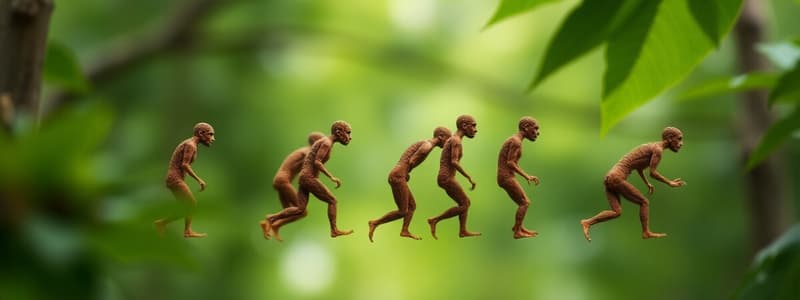Podcast
Questions and Answers
What does natural selection imply about individuals with favorable variations?
What does natural selection imply about individuals with favorable variations?
- They are less likely to compete for resources.
- They do not face any predators.
- They have a better chance of surviving and reproducing. (correct)
- They always produce more offspring than others.
Which factor does NOT indirectly support the theory of evolution?
Which factor does NOT indirectly support the theory of evolution?
- Overbreeding leading to competition.
- Survival of the fittest.
- Inherited variations among species members.
- Consistent population numbers over time. (correct)
Which of the following observations led to the conclusion of 'survival of the fittest'?
Which of the following observations led to the conclusion of 'survival of the fittest'?
- Some individuals escape predators better due to variations. (correct)
- All members of a species are identical.
- Animals reproduce at the same rate regardless of their traits.
- Species exhibit no inherited variations.
How did the structural changes in horses over time relate to environmental changes?
How did the structural changes in horses over time relate to environmental changes?
What key conclusion can be drawn from the concept of 'origin of species'?
What key conclusion can be drawn from the concept of 'origin of species'?
Which statement best describes the evidence supporting evolution?
Which statement best describes the evidence supporting evolution?
What is an example of a characteristic that horses developed in response to their environment?
What is an example of a characteristic that horses developed in response to their environment?
What does the term 'struggle for existence' refer to in the context of evolution?
What does the term 'struggle for existence' refer to in the context of evolution?
Flashcards are hidden until you start studying
Study Notes
Evolution
- Evolution is the inheritable change in a species in response to environmental changes over a long period of time
- Evolutionary changes are driven by natural selection
- Evolution cannot be proven
- Charles Darwin and Alfred Russell Wallace proposed the mechanism of evolution in 1858
- In 1859 "On the Origin of Species by means of Natural Selection" was published
- Darwin collected evidence for five years starting in 1832 on the HMS Beagle
Theory of Natural Selection
- Observations
- More offspring are produced than the environment can sustain
- Population numbers remain stable
- All individuals within a species, including those in the same population, have variations
- Conclusions
- Overbreeding results in a struggle for survival
- Individuals with advantageous variations are better adapted and have a higher chance of survival (Survival of the fittest)
- Over time, the accumulation of advantageous variations results in offspring that are divergent from their ancestors, eventually resulting in the formation of a new species
Horse Evolution
- 60 million years ago, the ancestor of the modern horse was 0.4 meters tall
- 30 million years ago, the size of a German Shepherd
- 10 million years ago, the size of a Great Dane
- 1 million years ago, the modern horse (Equus) was 1.6 meters tall
- Structural changes relate to adapting to different environments
- Fossil records cannot provide a complete account of evolution due to
- Limited fossilization of soft tissues
- Difficulty in dating older fossils
- Many fossils remain undiscovered
- Fossils are often lost to erosion
Studying That Suits You
Use AI to generate personalized quizzes and flashcards to suit your learning preferences.




